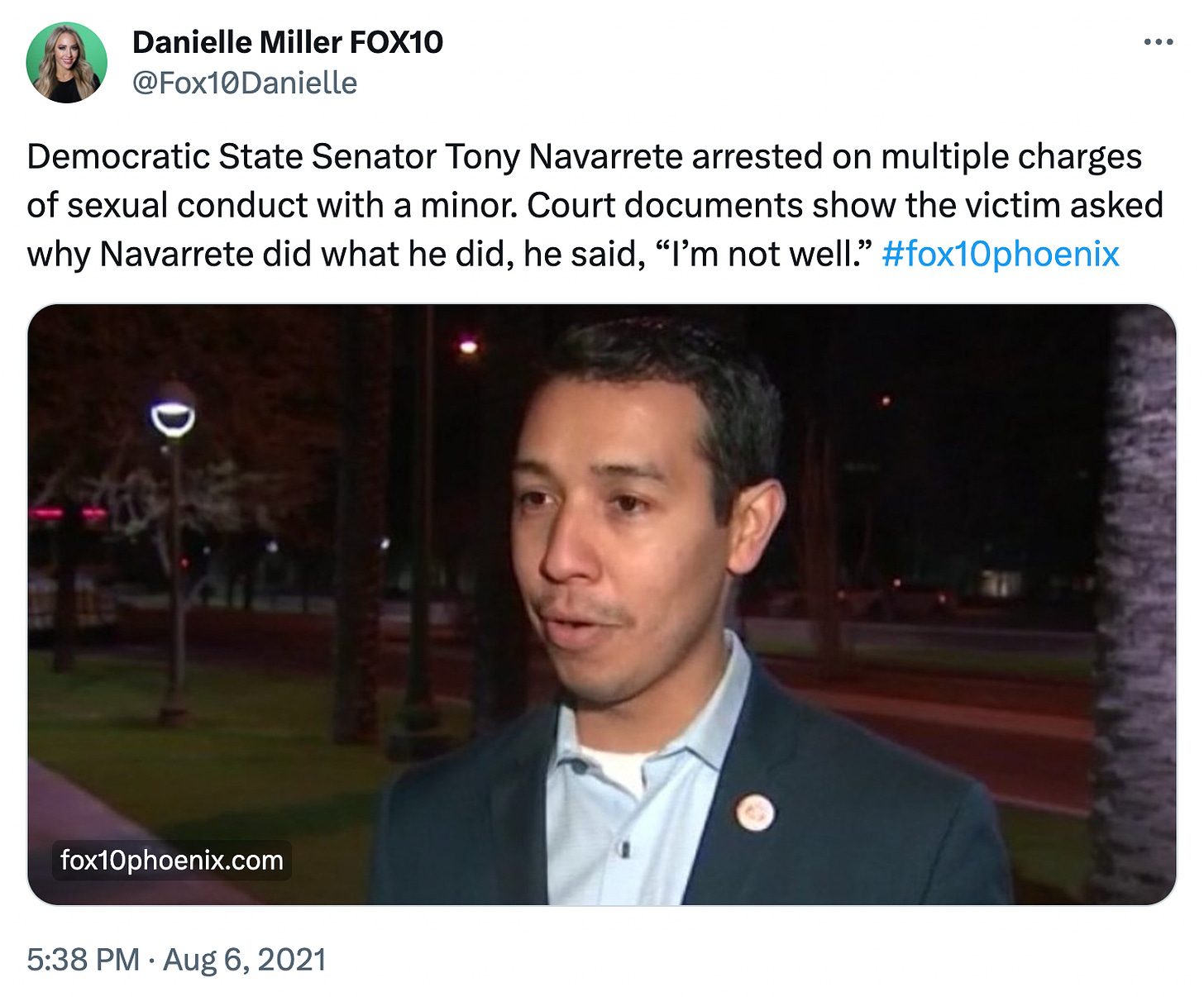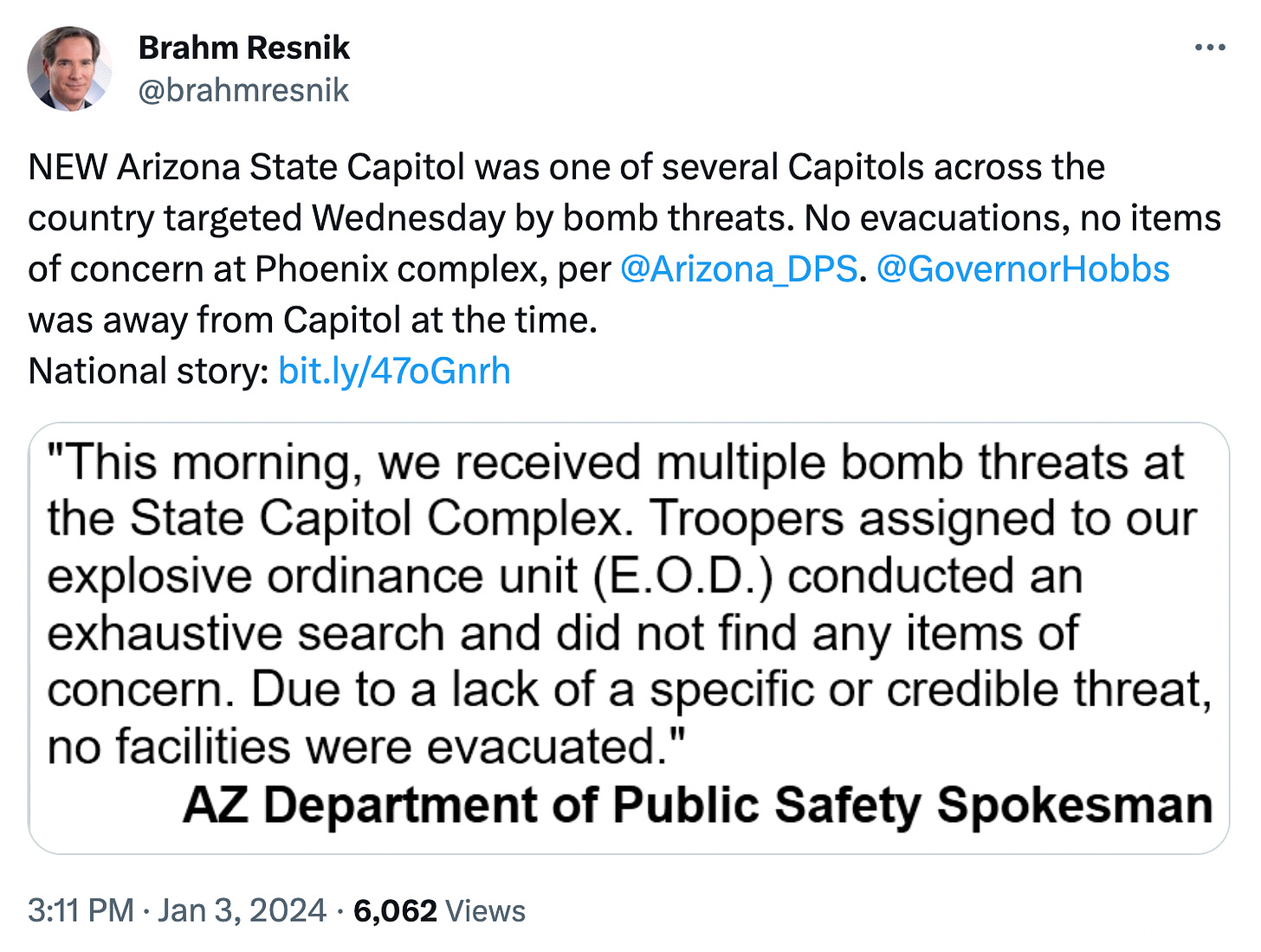In Defense of Secret Recordings
It's not just us shady journalists who do it ... Wait, there are adults in the room? ... And they're cute until they aren't.
After a Scottsdale mom almost got scammed by an artificial intelligence clone of her daughter’s voice calling to say she had been kidnapped and needed ransom money, Republican Rep. David Cook decided to do something about it.
But the “something” he came up with probably won’t stop scammers, and law enforcement officials say it may actually make it harder to prosecute other crimes.
Cook’s House Bill 2038 would make it a felony to record a conversation without telling someone, which Cook hopes will cut off access to the voice samples a scammer needs to create deep fakes.
Letting people know you’re recording a conversation with them may not seem like an unreasonable request — until you start considering the unintended consequences of outlawing secret recordings.
As reporters, it caught our eye because we frequently record interviews with politicians to double-check facts or make sure we get quotes right. It would be a minor annoyance for us to have to ask permission to record a phone call and a serious concern that we could be charged with a felony if we ever forgot to ask.
And sure, it’s hard to pity reporters for having to tell people, even politicians, before they start recording interviews.
But there are lots of reasons you might want to record another person, many of them far more important than getting a quote right.

Domestic violence victims or those seeking a restraining order, for example, may want to surreptitiously record their abusers for evidence.
People going through a divorce or custody battle may likewise want proof of their partner’s behavior — behavior they’d likely change before giving permission to record. It also comes up a lot in workplace harassment or retaliation cases — try asking your boss if it’s okay to record them threatening, hitting on, or berating you.
Then there are victims of sexual assault.
Think back to Democratic Rep. Tony Navarrete, who was arrested for child molestation in 2021 after one of his alleged victims called him, with police on the line recording, and got him to apologize.1 Police didn’t need a court order for that call because at least one person on the line — the victim — knew it was being recorded.
Most, if not all of the 13 states with “two-party consent” laws like Cook is proposing at least have some exceptions for law enforcement investigations. Should undercover cops have to tell people they’re wearing a wire?
Cook’s proposal doesn’t include any exemptions for law enforcement or anyone else.
That’s a big problem, according to Yavapai County Sheriff David Rhodes, who questioned the law’s effect on everything from calls between perpetrators and victims to police body cameras.
“I have grave concerns because there doesn't appear to be an exemption for legitimate law enforcement purposes. Having someone on a recorded call admitting to a crime is integral to many prosecutions,” he said.
Cook told us his bill is only a starting point, and there will be lots of opportunities to amend it as lawmakers dig into the details. He asked staff attorneys to base it on other states’ laws, and plenty of states have figured out how to require two-party consent without hindering law enforcement, he said.
He hasn’t spoken with law enforcement groups about it yet, he said, but he plans to seek their input.
“If we want to protect people, we need to know and I think we should know that if someone is recording you then they should be able to say, like you just did it, ‘Do you mind if I record this?’” he said.
We’ve posted our whole interview with Cook — which we got his permission to record — on our website. But it’s behind a paywall, so you free readers will have to pony up to listen.
HB2038’s lone co-sponsor, Republican Rep. Laurin Hendrix, told us it that while wasn’t exactly a passion project of his, Cook’s bill seemed reasonable enough. But after we asked about the potential unintended consequences, he had some second thoughts and said he may vote against it.
Stopping AI voice deep fakes is an admirable goal. But Cook’s HB2038 as written won’t do that. Instead, it will have a chilling effect on law enforcement investigations, victims of crimes and abuse, and, yes, even us lowly members of the press corps.
A house divided: Arizona’s Republican and Democratic caucuses agree that housing, education and water management are the big issues of the year when they return on Monday, but they have very different ideas of how to approach those problems. In an 11-minute video featuring the stars of the Senate’s Republican caucus, legislators touted their 2024 plans to use the state land trust fund to increase teacher pay, said they’ll push to increase the housing stock and use existing laws to handle rural groundwater. They also touched on child sex trafficking, fighting vaccine mandates and election integrity. Democrats are focused on guardrails for the state’s ESA program, expanding affordable housing through some yet-to-be-announced measures and protecting rural groundwater supplies, the Republic’s Mary Jo Pitzl writes.
“Children are being kidnapped, murdered and are being forced into the sex trafficking world because of state negligence. We will hold (the Department of Child Safety) accountable,” Republican Sen. David Farnsworth said in the video.
“We’re trying to show the voters and the people of Arizona that we are ready to govern for all Arizonans, that we are the adults in the room, that we are not bogged down with conspiracy theories and strange ideas," Democratic Rep. Oscar de los Santos told Pitzl.
Not up for the job: The Independent Prison Oversight Commission that Gov. Katie Hobbs created in January told her it can’t really do the whole oversight thing it was created for since they’re all just volunteers and overseeing prisons is a pretty big job that really should be independent of the Governor’s Office anyway, according to a report 12News’ Erica Stapleton obtained. The 11-member commission visited two prisons last year.
Riot reckoning: Federal prosecutors are calling for a six-month prison sentence for January 6 rioter Ray Epps, the former Arizona chapter leader for the extremist Oath Keepers group who pleaded guilty to a misdemeanor of disorderly conduct on restricted grounds in September, the Associated Press reports. Epps became the subject of a conspiracy theory that he incited the attack as an undercover government agent, spurring the defendant’s defamation lawsuit against Fox News for spreading the rumor.
Fiscal frost: The University of Arizona’s hiring and compensation freeze will last through June as the university hurries to reduce spending after amazingly miscalculating $240 million in cash on hand last year, per the Star’s Ellie Wolfe. New purchases will also have to go through a fresh set of red tape.
Ad avalanche: Noble Predictive Insights pollster Mike Noble told KJZZ’s Kirsten Dorman Arizona could see $800 million worth of political ads this year. The head of the market research firm said radio and TV advertisements will peak with the primaries in August.
This election year, please support local journalists instead of politicians and PACs.
Jerky judge: Cochise County Superior Court Judge John Kelliher earned his third conduct reprimand by the Arizona Supreme Court’s Commission on Judicial Conduct for making “condescending” statements about a mother in a juvenile dependency hearing, the Herald Review’s Terri Jo Neff reports. After the mother denied being impaired, Kelliher told her, “Ma'am if you're not high, then I need to find a different job,” according the the reprimand order. The judge was issued two reprimands on the same day in March 2023 for his “lack of courtesy and dignity while conducting court business.”
Ever heard of turnstiles?: The security company that checks tickets on the light rail is understaffed, and some Phoenix City Council members want to ensure people aren’t getting a free ride, the Daily Independent’s Mark Carlisle writes. While data shows more people are being removed for riding without a ticket, and citations increased nearly six-fold in November, short staffing could hamper the city’s ability to police free riders. Council Member Jim Waring suggested coming up with a way people cannot access transit stations without paying first.
Unanswered calls: Despite pledges from politicians to help Indigenous victims of healthcare fraud, government agencies have provided little aid for those affected by a purge of fraudulent rehabilitation facilities last year, the Arizona Mirror’s Shondiin Silversmith reports. Volunteer groups like StolenPeoplesStolenBenefits have stepped in to provide scam victims basic necessities while gathering their testimonies, but group member Reva Stewart said government offices haven’t responded to the hundreds of reports she’s submitted. Meanwhile, Arizona is getting three new and upgraded health centers for Native Americans, a much-needed development for the disproportionate rate of disease Native Americans experience in medically underserved areas, Cronkite News’ Caleb Scott reports.
More tests, more results: HIV cases spiked by 20% in Arizona in 2022, which could be because of a shortfall of testing during the onset of COVID-19, Paola Rodriguez from AZPM reports. Testing availability has now increased, which could correlate to an increase in positive tests, experts say.
The first committee meeting of 2024’s legislative session will commence at 9 a.m. on Tuesday, Jan. 9, with the new Committee on Transportation, Technology and Missing Children headed by Sen. David Farnsworth. The “Missing Children” is a new addition Farnsworth is championing after previously pedaling bizarre child trafficking conspiracy theories. It’s not clear how the subject will fit into the pavement condition and ADOT project delivery topics on the committee’s first agenda.
And the House Natural Resources, Energy and Water Committee is already slated to hear a few groundwater management bills sponsored by the committee chair, Rep. Gail Griffin, on the same day.
A small Gilbert neighborhood is getting some unwanted visitors, and as one resident put it: “It was fun at first, kind of cool to see random cows here and there … but it just got not so cool.”
Entire herds are roaming residential streets, and a huge cow pattie got five seconds of air time on 12News’ story about the chaos and car accidents the cattle have caused. People keep cutting the fence that Rancher Nancy Mix installed to box in the animals.
But it’s not all funny. Mix said she’s lost $20,000 worth of cattle, the cows have done severe damage to cars and people are chasing after them for sport, which can give them a heart attack.
Navarrete’s prosecution ended in a mistrial after jurors couldn’t decide if he had admitted to molesting the victim or simply some vague bad behavior. The Maricopa County Attorney’s Office says it is retrying the case with trial dates scheduled for next month.











Mr. Waring apparently does not ride the light rail to even suggest turnstiles (the platforms would have to be totally redesigned. If he did, he would know that the ticket machines may not work. I often ride "free" because I am not able to purchase a ticket or validate the ticket I already have. I have been told for over a year that we are getting new machines. I'm still waiting. And the same is true on the buses. Sometimes the machines will not take cash. Sometimes they are not able to validate the tickets. I'm not surprised by all the free riders on the light rail. Anyone with common sense would know that the honor system is highly overrated on public transit. Being an avid proponent for public transit it's sad that we did not have enough people who were experienced riders (in many different cities and countries) to plan the system. And don't get me started on how poorly designed the stations are for our climate.
I was a 20-something entry level marketing person at a theatre company who, more than once, needed to record a phone call with the artistic director who didn't want to put his abusive language in writing. My recordings didn't get him fired but it did give the board ammunition to restrict his some of his actions. Requiring two (or more) of the people to consent is only going to help those who hold power, and not people trying to keep them accountable.